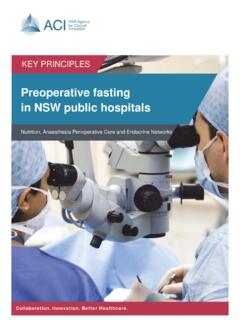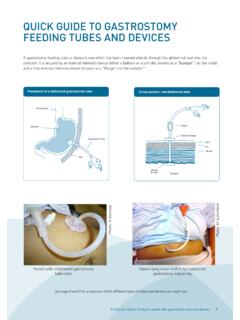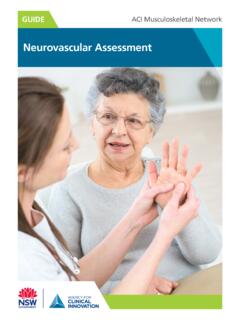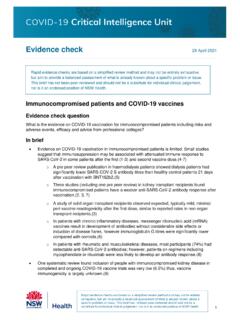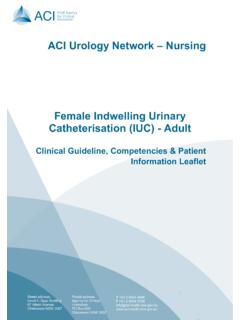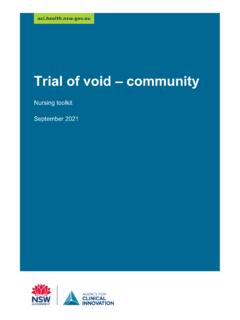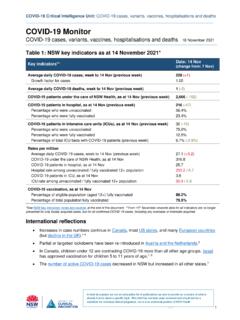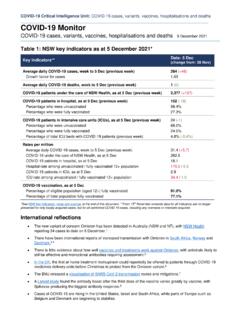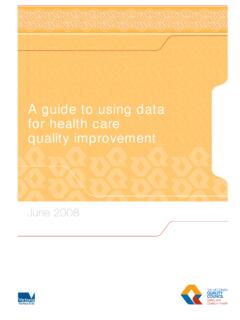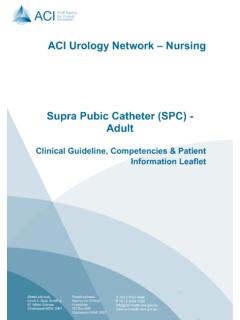Transcription of Overview: What are PROMs and PREMs?
1 overview : what are PROMs and PREMs? Raj Verma Director, Clinical Program Design & Implementation, ACI. overview 1. Using patient experience to develop Integrated Care 2. Introduction to PROMs and PREMs 3. State-wide approach 4. Pilot 5. System and process options/. requirements, including IT. Betty's Story Betty, aged 82, has a chronic illness Key themes: Poor case management, care co-ordination and communication Multiple clinicians and appointments Too difficult to get to GP and there is no one to come to the house Reference: ARCHI Patient Story Library Integrated Care AKA: person-centred, co-ordinated care (UK).
2 Aims: Keep people healthy at home for longer Improve people's experience of care Identify unmet' need Improve navigability' of the health system Enablers: Patient Reported Outcome Measures ( PROMs ). Real time patient feedback facilitated by Patient Reported Experience Measures (PREMs). Original scope PROM and real time patient feedback . PROM Short term PROM Long term Feedback on immediate Feedback on longer term Now individual care clinical outcomes PROM. and PREM Short term PREM Long term PREM. Feedback on Feedback on current integration system of of care integrated care Patient Experience Purpose: allows patients to provide direct feedback on their care to drive improvement in services.
3 Qualitative and quantitative approaches Surveys: paper and electronic PETs Focus Groups Patient story/ journey Observation Patient Journey Approach 1. Identify common stages in patient experiences. 2. Track an individuals' ideal health pathway and identify push and pull factors regarding access to health care. 3. Identify and monitor which services and health professionals people engage with, their experience of these services and health outcomes. 4. Involve patients in articulating and mapping their own ideal health outcomes and pathways. Consumers Health Forum. (2013). Capturing, analysing and using consumers' health experience narratives to drive better health outcomes.
4 PROMs Patient Reported Outcome Measures Capture a person's perception of their health Validated generic & disease specific tools Measure: Symptoms Distress/ Anxiety Unmet need EQ-5D: We would like to know how good or bad your health is PROMs Examples today. Quality of life EQ-5D, AQoL. Symptoms pain (NPRS), fatigue (FSS). Distress depression (K10, PHQ- 2), anxiety (GAD7). Functional ability WHODAS , ODI. Self-reported health status SF-36. Self-efficacy GSE. PREMs Patient Reported Experience Measures Capture a person's perception of their experience with health care or service. Various indicators included in validated surveys/ questionnaires CAHPS (US).
5 Newer attempts to measure integrated care Singer, Picker Institute Europe NHS Inpatient Survey 2011/12. PREMs Examples Time spent waiting Access to and ability to navigate services Involvement (consumer and carer) in decision- making Knowledge of care plan and pathways Quality of communication Support to manage long-term condition Would they recommend the service to family and friends PROMs & PREMs Purpose Individual Improve quality of care by informing care planning and management Accessible, Service Relevant and consistent and Identify what 's working meaningful to well and areas for transparent improvement clinicians and information consumers System Evaluate system of integration and outcomes Advantages in practice Improve ability to detect worsening of symptoms (Lambert, 2010).
6 Provide information that may have otherwise been missed (Worthen& Lambert, 2007). Reduce drop out ( Miller et al. 2006). Improves outcomes (Bickmanet al 2011). Enhance shared decision making (Coulter 2010). Ensure voice of service user is heard (Greenhalgh 2009). Wolpert. (2014). PROMs in Child and Adolescent Mental Health. State-wide approach 1. Establish project governance. 2. Research the systems and tools. 3. Obtain ethical approval. 4. Develop PROMs and PREMs: consultation and collaboration with patients, clinicians and experts. 5. Build the infrastructure: partnership with eHealth NSW. 6. Pilot PROMs and PREMs: specific sites or with specific populations.
7 7. Wider implementation and evaluation: supporting patients and clinicians to engage and benefit. Project phases Literature review Feedback, Deploy Patient reporting resources on to assessment Collection the ground to and tools systems educate and analysis systems support IT systems Research the systems and Support clinicians and Build the infrastructure tools patients to engage and benefit The main challenge is to Source or build a collection Lit review underway. respond in a timely and system and procure input Establishing governance supportive way to the tools. group. information collected. Decide how integrated the Review of Cancer Institute Co-design responses to solution can be within NSW IT system.
8 Issues identified. time/budget scope. Significant culture change Pilot in 2-3 sites. and education effort for clinicians (and patients). required. Pilot: 2015. Aim to pilot PROMs and PREMs in 2-3 sites: LHD Demonstrators, LHD Planning and Innovation Fund (PIF) recipients. EOI process to open Dec 2014 with invitation to submit proposals. This afternoon's workshop is an opportunity to further define and scope the pilot and discuss the following considerations. Key considerations PROMs and PREMs must be : Meaningful to consumer and clinician Not burdensome or duplicative: aim for high response rates Interpreted with appropriate level of tentativeness; not trump other forms of knowledge Support collaborative working Adapted from Wolpert.
9 (2014). PROMs in Child and Adolescent Mental Health. Pilot: Key considerations Who is the target population? People with multiple chronic Older people with complex conditions physical and needs frailty, functional/. mental health cognitive decline Integrated Care Common Cohort vs. disease Vulnerable/ prioritised specific? Younger people with complex populations Aboriginal needs disability, chronic people, CALD communities, conditions, mental health low SES, rural and remote How to identify, access and engage the target population in the development of PROMs and PREMs? Systems and Processes Process for capturing PROMs & PREMs Part of care process/ work flow Timeline: when to administer/ re-administer Tools Options Digital and/or paper- PETs based questionnaire Smartphone/ Tablet Consumer-centric: Website responsive to needs Social media?
10 Low health literacy Systems and Processes Process for accessing and responding to PROMs & PREMs When, how and by whom? Tools Options Algorithms Standalone system Health Pathways Shared Care Plan HealtheNet eMR/ PCEHR build Paper-based PDF. Report? Questions?
